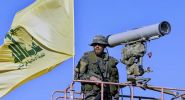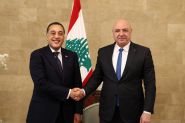The Cabinet met on Friday at the presidential palace in Baabda and approved the Lebanese Army’s plan to restore the state’s monopoly on weapons after reviewing its various phases, presented by Army Commander Gen. Rodolphe Haykal.
The session, chaired by President Joseph Aoun, gave the green light to the military’s action plan in the absence of five Shia ministers who walked out “to remain consistent with their position” opposing Hezbollah’s disarmament. Instead, they called for a vague national defense strategy, an approach seen as Hezbollah’s attempt to buy time, preserve its arsenal and retain its grip on state decision-making.
Minister of Information Paul Morcos announced the launch of the disarmament process in carefully measured language, emphasizing that implementation will proceed “in line with available logistical, human and financial resources.” He echoed Haykal’s warnings about “practical constraints” in executing the plan, but stressed that the army would push forward regardless.
Diplomatic engagement is expected to follow, with US envoy Morgan Ortagus due in Beirut shortly, accompanied by US Centcom commander Adm. Brad Cooper, who arrived on Friday.
Morcos insisted that Lebanon “will make no concessions to Israel” while also underscoring that the army’s plan itself is not up for negotiation. He acknowledged Israeli raids as a potential obstacle but rejected claims that they could derail the process entirely.
Speaker Nabih Berri, according to local media, cautiously welcomed the government’s formula, noting that the army’s plan does not set a fixed timetable for disarmament and links its implementation to Israeli acceptance.
A Five-Phase Plan
Morcos said the Cabinet “welcomed” the army’s proposal, deliberately avoiding terms such as “approved.” The plan will unfold in five stages: first, demilitarizing the area south of the Litani River in line with the November ceasefire agreement; then extending to the area between the Litani and the Awali River; followed by Beirut and its southern suburbs; then the Beqaa Valley; and finally, the rest of the country.
The government requested that Gen. Haykal submit progress reports on the disarmament process, while keeping both the plan’s phases and internal deliberations confidential.
At the same time, the Cabinet pledged to develop a “national security strategy,” rather than a “defense strategy,” Hezbollah’s preferred term, framed around extending state authority across all Lebanese territory and maintaining the exclusive right to arms in the hands of the armed forces.
Prime Minister Nawaf Salam stressed that no one in Lebanon would feel safe, and investments would not flow, until the monopoly of weapons is restored. “All reforms must be carried out under this principle if they are to succeed,” he said.
President Aoun opened the session by denouncing ongoing Israeli air raids and later announced that he had returned the law regulating the judiciary to Parliament, citing “formal, substantive and procedural flaws” that rendered parts of it inapplicable and inconsistent with international standards.
Other Decisions
At the start of the session, the Cabinet also approved four additional agenda items: the payment of August financial bonuses to military personnel; a Ministry of Environment report on halting the export of chemical substances from Tripoli and Zahrani oil facilities; a Ministry of Energy request to ratify a direct contract with Kuwait Petroleum Corporation for Trading; and a Ministry of Finance draft decree to finalize a $250 million renewable energy loan agreement with the World Bank.



Comments